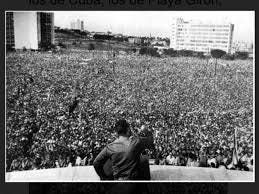Second Declaration of Havana, 60th anniversary
Fidel speaks of the crisis of imperialism and the interest of humanity in socialism
It has been said of Fidel that he gave pedagogical discourses. This was illustrated on February 4, 1962, when Fidel offered a history lesson in a speech that came to be known as the Second Declaration of Havana, delivered to more than one million people in the Plaza of the Revolution, an event that was commemorated this past week in Cuba. In the historic discourse, Fidel presented an overview of world history that is a synthesis of Marxism-Leninism, written from the perspective of the revolutions of workers and peasants in Europe; and a colonial analysis, based in the Third World perspective of revolutionary struggles for national liberation. The mass assembly was convoked by Fidel in response to the expulsion of Cuba from the Organization of American States on January 31, 1962, at a meeting of the foreign ministers in Punta de Este, Uruguay.



